Subclinical Atherosclerosis Burden Shapes All-Cause Mortality Risk
HCPLive
OCTOBER 1, 2024
Subclinical atherosclerosis burden and its progression are independently linked to the risk of death from any cause in asymptomatic individuals.
This site uses cookies to improve your experience. By viewing our content, you are accepting the use of cookies. To help us insure we adhere to various privacy regulations, please select your country/region of residence. If you do not select a country we will assume you are from the United States. View our privacy policy and terms of use.
 Atherosclerosis Related Topics
Atherosclerosis Related Topics 
HCPLive
OCTOBER 1, 2024
Subclinical atherosclerosis burden and its progression are independently linked to the risk of death from any cause in asymptomatic individuals.

Science Daily - Heart Disease
SEPTEMBER 18, 2024
A team developed a nanoparticle technology that offers an effective solution to diagnose and treat atherosclerosis, in a non-invasive manner.

DAIC
JULY 23, 2024
The International Atherosclerosis Society (IAS) has released a clinical proceedings white paper outlining the role of inflammation in atherosclerosis and the importance of early intervention. Systemic, chronic inflammation can also promote the advancement of atherosclerosis and increase the risk of developing cardiovascular diseases.

Nature Reviews - Cardiology
SEPTEMBER 10, 2024
Can we resynchronize the immune system in atherosclerosis and save the king? After decades of research, the study of atheroimmunology has brought the first therapeutics to the clinic.
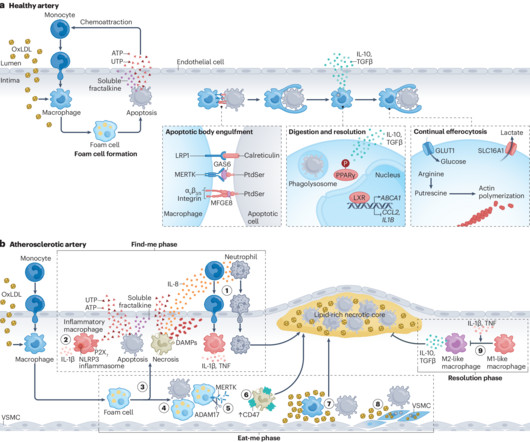
Nature Reviews - Cardiology
MAY 14, 2024
Nature Reviews Cardiology, Published online: 15 May 2024; doi:10.1038/s41569-024-01037-7 In this Review, Adkar and Leeper describe the mechanisms of programmed cell death and efferocytosis, discuss how efferocytosis becomes impaired in atherosclerosis and other cardiometabolic diseases, and suggest potential strategies to target these pathways for (..)

Nature Reviews - Cardiology
SEPTEMBER 19, 2024
Nature Reviews Cardiology, Published online: 20 September 2024; doi:10.1038/s41569-024-01072-4 In this Review, the authors describe the bidirectional crosstalk between lysosome biology and immune cell function and polarization, focusing on immunometabolic reprogramming in the context of atherosclerosis and highlighting knowledge gaps and potential (..)
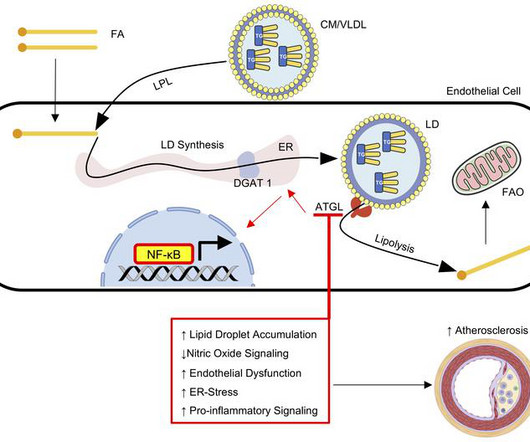
Journal of Clinical Investigation - Cardiology
FEBRUARY 15, 2024
Blood vessels are continually exposed to circulating lipids, and elevation of ApoB-containing lipoproteins causes atherosclerosis. Consistent with this mechanism, deletion of endothelial ATGL markedly increased lesion size in a model of atherosclerosis.

American College of Cardiology
JUNE 25, 2024
Do autoimmune diseases independently correlate with coronary atherosclerosis and atherosclerotic cardiovascular disease (ASCVD) risk, and do traditional cardiovascular risk factors modulate the risk?
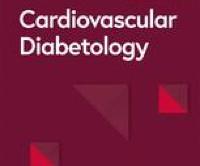
Cardiovascular Diabetology
DECEMBER 18, 2023
Elevated glycated hemoglobin (HbA1c) is associated with a higher burden of subclinical atherosclerosis (SA). However, the association with SA of earlier insulin resistance markers is poorly understood. The stu.

Science Daily - Heart Disease
SEPTEMBER 4, 2024
Our risk of developing atherosclerosis -- 'furring' of the arteries -- can begin much earlier in life than was previously thought, highlighting the need to keep cholesterol levels low even when we are young, new research has discovered.

Journal of Clinical Investigation - Cardiology
OCTOBER 1, 2024
Clonal hematopoiesis of indeterminate potential (CHIP) has emerged as a previously unrecognized, potent, age-related, and common risk factor for atherosclerosis. Experimental evidence supports the causality of certain CHIP mutations in accelerated atherosclerosis. Cardiovascular disease accounts for much of this gap.

HCPLive
AUGUST 30, 2024
Sara Diaz Savaria, MD, discusses a study from ESC Congress 2024 examining the utility of cancer history in women as a predictor of subclinical atherosclerosis.
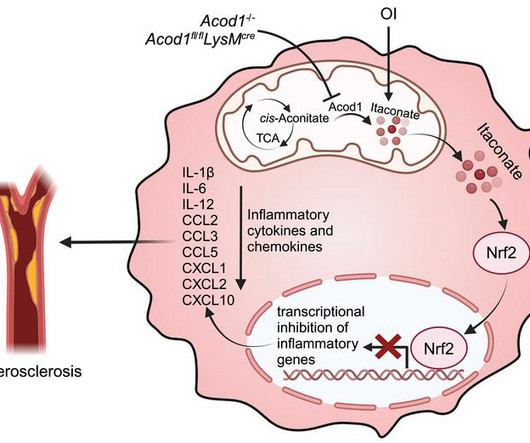
Journal of Clinical Investigation - Cardiology
FEBRUARY 1, 2024
Here, we examined the therapeutic potential of itaconate in atherosclerosis. Deletion of Acod1 in myeloid cells exacerbated inflammation and atherosclerosis in vivo and resulted in an elevated frequency of a specific subset of M1-polarized proinflammatory macrophages in the atherosclerotic aorta.
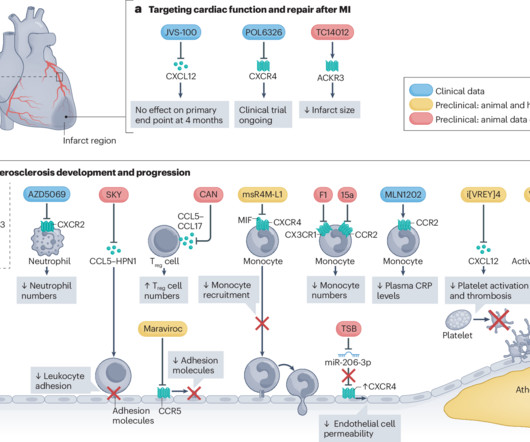
Nature Reviews - Cardiology
APRIL 24, 2024
Nature Reviews Cardiology, Published online: 25 April 2024; doi:10.1038/s41569-024-01023-z In this Review, the authors discuss the receptors, ligands and interactors that regulate immune cell recruitment in atherosclerosis, describe mechanisms that promote the resolution of inflammation in atherosclerotic lesions, and highlight potential strategies (..)
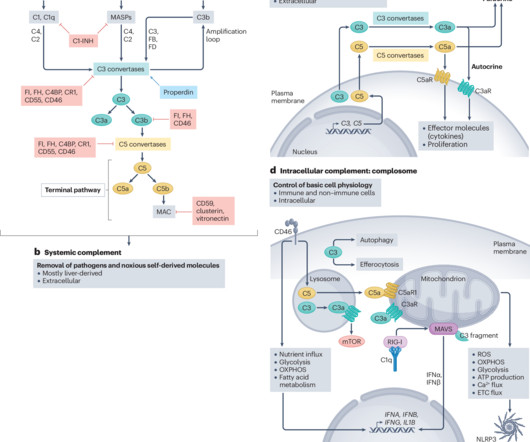
Nature Reviews - Cardiology
APRIL 9, 2024
Nature Reviews Cardiology, Published online: 10 April 2024; doi:10.1038/s41569-024-01016-y In this Review, Kemper and colleagues discuss the canonical and non-canonical roles of the complement system in the pathogenesis of atherosclerosis and discuss potential new therapeutic strategies targeting the complement system for the prevention and treatment (..)

Medical Xpress - Cardiology
DECEMBER 12, 2023
University of Virginia School of Medicine researchers have created an "atlas of atherosclerosis" that reveals, at the level of individual cells, critical processes responsible for forming the harmful plaque buildup that causes heart attacks, strokes, and coronary artery disease.

Frontiers in Cardiovascular Medicine
JULY 24, 2024
Although the entire vascular bed is constantly exposed to the same risk factors, atherosclerosis manifests a distinct intra-individual pattern in localization and progression within the arterial vascular bed.
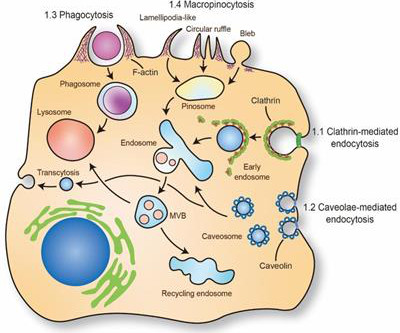
Frontiers in Cardiovascular Medicine
APRIL 4, 2024
Biomechanical forces, including vascular shear stress, cyclic stretching, and extracellular matrix stiffness, which influence mechanosensitive channels in the plasma membrane, determine cell function in atherosclerosis.

American College of Cardiology
APRIL 15, 2024
The following are key points to remember from a state-of-the-art review on the long-term safety of low-dose colchicine for atherosclerosis.

Nature Reviews - Cardiology
MARCH 11, 2024
Nature Reviews Cardiology, Published online: 12 March 2024; doi:10.1038/s41569-024-01007-z Shoaran and Maffia recount how our understanding of the role of inflammation in atherosclerosis has evolved and highlight the study by Göran Hansson and colleagues that provided the first hint of the involvement of the adaptive immune response in atherosclerosis. (..)

Medical Xpress - Cardiology
JANUARY 24, 2024
Atherosclerosis, a chronic inflammatory disease of the inner walls of blood vessels, is responsible for many cardiovascular conditions. Dendritic cells, which act to recognize foreign substances in the body and mount an immune response, play an important role in the disease.

Cardiometabolic Health Congress
JUNE 20, 2024
The EAS 2024 Congress (May 26-29, 2024) has concluded, providing critical insights into atherosclerosis and related vascular disease. Shapiro (United States of America) focused on preventing atherosclerosis over myocardial infarction, suggesting that CAC’s late-stage detection does not fit classic definitions of primary prevention.

Science Daily - Stroke
JANUARY 13, 2024
A groundbreaking 3D, three-layer nanomatrix vascular sheet that possesses multiple features of atherosclerosis has been applied for developing a high-throughput functional assay of drug candidates to treat this disease, researchers report.
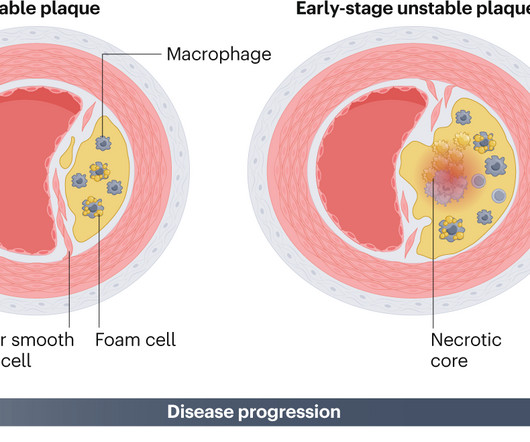
Nature Reviews - Cardiology
JANUARY 1, 2024
In this Review, De Meyer and colleagues describe the various forms of programmed macrophage death in atherosclerosis and the potential therapeutic implications.

Med Page Today
DECEMBER 4, 2023
(MedPage Today) -- The link between childhood blood pressure (BP) and adult atherosclerosis appeared stable going all the way back to infancy, suggesting that efforts to prevent arterial thickening may be beneficial starting at the earliest life.
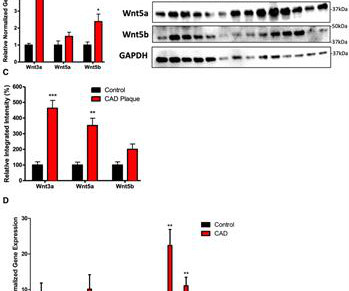
Frontiers in Cardiovascular Medicine
MARCH 21, 2024
Introduction The progression of coronary atherosclerosis is an active and regulated process. The Wnt signaling pathway is thought to play an active role in the pathogenesis of several cardiovascular diseases; however, a better understanding of this system in atherosclerosis is yet to be unraveled.

Medical Xpress - Cardiology
MARCH 22, 2024
Atherosclerosis is the major contributor to cardiovascular mortality worldwide. Diet-induced metabolic abnormalities including obesity, hyperglycemia, dyslipidemia, insulin resistance (IR), and non-alcoholic fatty liver disease are considered atherogenic risk factors.

Medical Xpress - Cardiology
JANUARY 23, 2024
Scientists at the Centro Nacional de Investigaciones Cardiovasculares (CNIC) in Madrid have found that one of the most potent genetic risk factors for Alzheimer's disease, apolipoprotein E4 (APOE4), is also associated with an increased risk of developing subclinical atherosclerosis in middle age.

Medical Xpress - Cardiology
JANUARY 15, 2024
A new 3D, three-layer nanomatrix vascular sheet that possesses multiple features of atherosclerosis has been applied for developing a high-throughput functional assay of drug candidates to treat this disease, University of Alabama at Birmingham researchers report in the journal Biomaterials in a paper titled "Atherosclerotic three-layer nanomatrix (..)

Science Daily - Heart Disease
APRIL 30, 2024
Researchers have discovered that the smooth muscle cells that line the arteries of people with atherosclerosis can change into new cell types and develop traits similar to cancer that worsen the disease.

Frontiers in Cardiovascular Medicine
JUNE 17, 2024
BackgroundWhile Traditional Chinese Medicine (TCM) boasts an extensive historical lineage and abundant clinical expertise in addressing atherosclerosis, this field is yet to be penetrated adequately by bibliometric studies. The Journal of Ethnopharmacology leads with the most publications and boasts the greatest total number of citations.
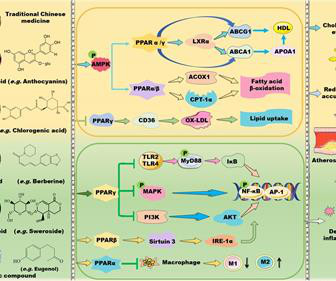
Frontiers in Cardiovascular Medicine
APRIL 18, 2024
Inflammation and dyslipidemia are critical inducing factors of atherosclerosis. However, synthesized PPAR agonists exhibit contrary therapeutic effects and various side effects in atherosclerosis therapy. However, synthesized PPAR agonists exhibit contrary therapeutic effects and various side effects in atherosclerosis therapy.
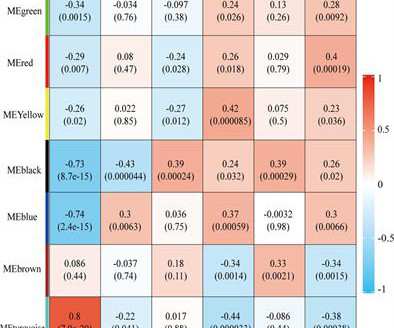
Frontiers in Cardiovascular Medicine
JANUARY 9, 2024
Atherosclerosis is a chronic inflammatory disease characterized by endothelial dysfunction and plaque formation. Under pro-inflammatory conditions, endothelial cells can undergo endothelial-to-mesenchymal transition (EndMT), contributing to atherosclerosis development.

Frontiers in Cardiovascular Medicine
JULY 11, 2024
The research progress of endoplasmic reticulum (ER) stress in atherosclerosis (AS) is of great concern. The ER, a critical cellular organelle, plays a role in important biological processes including protein synthesis, folding, and modification.

American College of Cardiology
JULY 1, 2024
This expert opinion is based on Primary Prevention of Subclinical Atherosclerosis in Young Adults: JACC Review Topic of the Week.

Heart BMJ
SEPTEMBER 25, 2024
Introduction The British Cardiovascular Society (BCS)/British Heart Foundation (BHF)/British Atherosclerosis Society (BAS)/British Society for Cardiovascular Research (BSCR) Young Investigator Award (YIA) was established in 2001.

The British Journal of Cardiology
JUNE 14, 2024
Designed to give healthcare professionals an understanding of lipid metabolism and its role in atherosclerosis. Module first published 9 July 2015 Module first revised 17 March 2021 Second revision June 2024

Medical Xpress - Cardiology
FEBRUARY 22, 2024
Men who were physically fit when they were young had a lower risk of atherosclerosis almost 40 years later, according to a study led by researchers at Linköping University, Sweden.

Frontiers in Cardiovascular Medicine
JUNE 12, 2024
Atherosclerosis (AS) is a complex disease caused by multiple pathological factors threatening human health-the pathogenesis is yet to be fully elucidated.

Frontiers in Cardiovascular Medicine
FEBRUARY 29, 2024
So far, researchers have focused on the significance of silicon for the development of bones and connective tissue, and its role in preventing neurodegenerative diseases and atherosclerosis. Despite numerous studies, the role of silicon as an active element in the human body is poorly understood.

Frontiers in Cardiovascular Medicine
JULY 24, 2024
ObjectiveThis study aimed to investigate the prevalence of carotid atherosclerosis (CAS), especially among seniors, and develop a precise risk assessment tool to facilitate screening and early intervention for high-risk individuals.MethodsA comprehensive approach was employed, integrating traditional epidemiological methods with advanced machine learning (..)

Nature Reviews - Cardiology
OCTOBER 17, 2024
Two new studies document that, despite similar overall exposure to high-fat diet over a lifetime, an intermittent consumption of high-fat diet early in life accelerates atherosclerosis compared with continuous consumption of a high-fat diet. The mechanisms for accelerated atherosclerosis include reprogramming of macrophages and neutrophils.

Journal of Cardiovascular Pharmacology
NOVEMBER 16, 2023
This modification will affect not only the onset of diabetes but also the related onset of atherosclerosis. Therefore, in this review, based on the whole process of atherosclerosis evolution, we explored the possible existence of acetylation/deacetylation caused by diabetes.
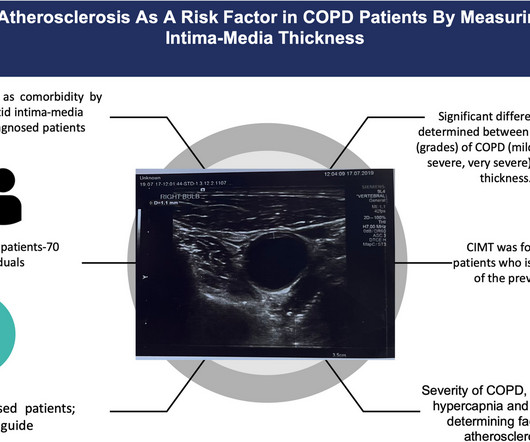
Cardiovascular Ultrasound
JANUARY 9, 2024
This study aimed to evaluate atherosclerosis as comorbidity by measuring the carotid (bulb and common carotid artery) Carotid intima-media thickness in COPD-diagnosed patients and to evaluate the relationship.
Expert insights. Personalized for you.
We have resent the email to
Are you sure you want to cancel your subscriptions?

Let's personalize your content